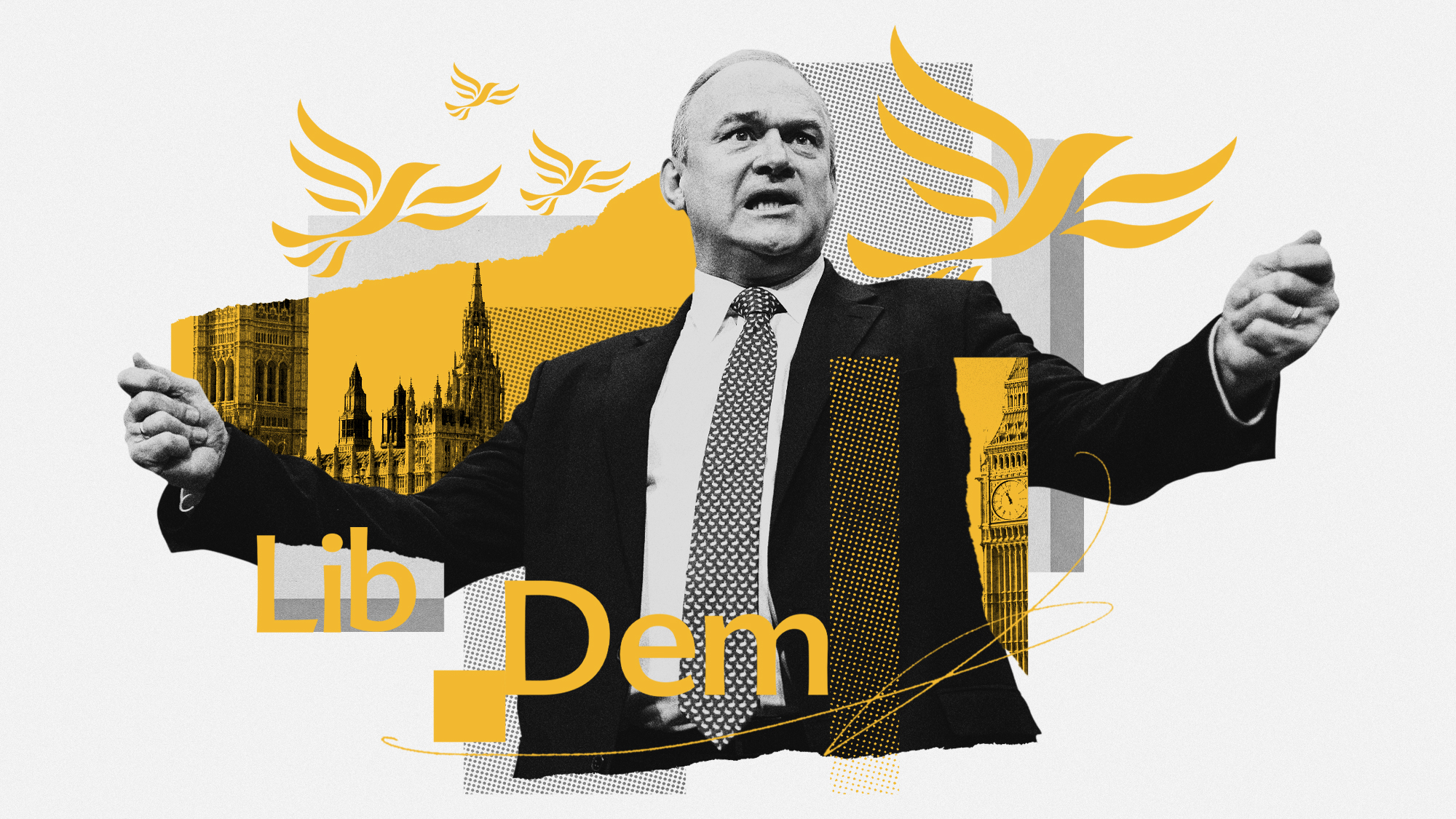Grim prediction for Lib Dems makes new coalition less likely
Clegg’s MPs are not as popular as they think - study suggests fewer than 20 will survive election

A free daily email with the biggest news stories of the day – and the best features from TheWeek.com
You are now subscribed
Your newsletter sign-up was successful
Perhaps Nick Clegg knew what he was doing when he skipped the Autumn Statement last week and spent the day canvassing in the West Country.
It seems he and his colleagues can’t do enough canvassing: the Lib Dems could lose even more seats in May’s general election than their meagre poll ratings suggest, according to a new academic study. They could be left with fewer than 20 of their current 56 MPs, casting a shadow over the party’s future and over its ability to negotiate any new coalition deal with the Tories or indeed with Labour.
The study totally contradicts a recent calculation by Lord Ashcroft that the Lib Dems might not do as badly as the national polls suggest because of the local popularity of their incumbent MPs.
The Week
Escape your echo chamber. Get the facts behind the news, plus analysis from multiple perspectives.

Sign up for The Week's Free Newsletters
From our morning news briefing to a weekly Good News Newsletter, get the best of The Week delivered directly to your inbox.
From our morning news briefing to a weekly Good News Newsletter, get the best of The Week delivered directly to your inbox.
That’s wrong, says Oxford don Stephen Fisher, who has analysed early data from the British Election Study online panel survey, collected by YouGov in September and October.
It shows that the Lib Dems have been losing support more heavily in the constituencies they currently hold than they are generally across the country. In short, their incumbent MPs are not as popular as they might like to think.
Fisher says: “The Liberal Democrats are clearly losing most in the seats where they started strongest and losing least where they started weakest... If they are indeed losing most heavily in the seats they are defending they are set to lose several more seats than national polls with uniform swing would predict.”
Which puts him at loggerheads with Lord Ashcroft, the Tory Tory fund-raiser turned pollster, who found in recent polling in 11 Lib Dem-Conservative marginal seats that “the powerful incumbency factor enjoyed by many Lib Dem MPs is clearly on display.
A free daily email with the biggest news stories of the day – and the best features from TheWeek.com
“A quarter of those saying they would vote Labour in the standard voting intention question (‘which party would you vote for in an election tomorrow?’) switched to the Lib Dems when asked the localised question (‘thinking about your own parliamentary constituency at the next general election and the candidates who are likely to stand for Westminster there, which party’s candidate do you think you will vote for?’).”
Fisher acknowledges that it is possible that as the election gets closer “the Liberal Democrats will benefit from voters focusing more on the specific situation in their constituency, with tactical voting and incumbency effects kicking in”.
But, he says, “there is a danger that such prompting [by Ashcroft’s pollsters] over-states incumbency advantage. For many Liberal Democrat MPs to hold on to their seats they will need to become even more personally popular than they were in 2010: a tough task under the circumstances.”
The issue is likely to be closely scrutinised at the launch in London today of the British Election Study. The large academic project involving Manchester, Oxford and Nottingham universities is funded by the Economic and Science Research Council. These studies have been conducted at every general election since 1964.
The BES project also has bad news for the Conservatives – offering a definitive answer to the question: Will Ukip do more damage to the Tories than Labour next May? The answer is Yes.
Geoff Evans and Jon Mellon of Oxford University say: “We can see that Ukip’s voters are overwhelmingly taken from those who voted Conservative in 2010. Even the Liberals lose more to Ukip than do Labour.
“BES data shows quite clearly that it’s the Conservative Party who need to worry most about the threat of Ukip – because those people who supported Labour [in the past] have, in the main, already made the switch.”
The idea that Ukip are an equal threat to Labour gained ground when they came within 617 votes of grabbing the Labour seat of Heywood and Middleton in an October by-election.
Evans and Mellon explain that ex-Labour supporters in Ukip’s ranks were lost by Tony Blair, not Ed Miliband. They voted Labour in 2005 but not in 2010.
“New Labour’s move to the liberal consensus on the EU and immigration in 2001, 2005 and 2010, left many of their core voters out in the cold a long time before Ukip were around.”
Taken together, the BES studies augur badly for a continuation of the Tory/Lib Dem coalition. Losses by both of the partners mean they would struggle to gather enough MPs to command a majority in the House of Commons after 7 May.
It’s good news for Ed Miliband – who also received some cheering data from Scotland yesterday. New polling by Populus suggests the swing to the SNP is not nearly as dramatic as predicted in an Ipsos-MORI poll at the end of October. That polling gave the SNP a 30-point lead over Labour leading to predictions of a wipeout for Labour north of the border: the Populus survey gives the SNP only a three-point lead, causing Labour to lose perhaps 13 of their current 41 MPs in Scotland - bad but not a catastrophe.
As Mike Smithson of Polical Betting commented: “If this Populus data is on the right lines then the Labour chances of becoming top party nationally are a bit higher.”
-
 How the FCC’s ‘equal time’ rule works
How the FCC’s ‘equal time’ rule worksIn the Spotlight The law is at the heart of the Colbert-CBS conflict
-
 What is the endgame in the DHS shutdown?
What is the endgame in the DHS shutdown?Today’s Big Question Democrats want to rein in ICE’s immigration crackdown
-
 ‘Poor time management isn’t just an inconvenience’
‘Poor time management isn’t just an inconvenience’Instant Opinion Opinion, comment and editorials of the day
-
 How corrupt is the UK?
How corrupt is the UK?The Explainer Decline in standards ‘risks becoming a defining feature of our political culture’ as Britain falls to lowest ever score on global index
-
 The high street: Britain’s next political battleground?
The high street: Britain’s next political battleground?In the Spotlight Mass closure of shops and influx of organised crime are fuelling voter anger, and offer an opening for Reform UK
-
 Is a Reform-Tory pact becoming more likely?
Is a Reform-Tory pact becoming more likely?Today’s Big Question Nigel Farage’s party is ahead in the polls but still falls well short of a Commons majority, while Conservatives are still losing MPs to Reform
-
 Taking the low road: why the SNP is still standing strong
Taking the low road: why the SNP is still standing strongTalking Point Party is on track for a fifth consecutive victory in May’s Holyrood election, despite controversies and plummeting support
-
 The Liberal Democrats: on the march?
The Liberal Democrats: on the march?Talking Point After winning their highest number of seats in 2024, can the Lib Dems marry ‘stunts’ with a ‘more focused electoral strategy’?
-
 Can the Lib Dems be a party of government again?
Can the Lib Dems be a party of government again?Today's Big Question Leader Ed Davey is urged to drop the stunts and present a serious plan for the country
-
 What difference will the 'historic' UK-Germany treaty make?
What difference will the 'historic' UK-Germany treaty make?Today's Big Question Europe's two biggest economies sign first treaty since WWII, underscoring 'triangle alliance' with France amid growing Russian threat and US distance
-
 Is the G7 still relevant?
Is the G7 still relevant?Talking Point Donald Trump's early departure cast a shadow over this week's meeting of the world's major democracies